Media Centre
Our latest news and
announcements.
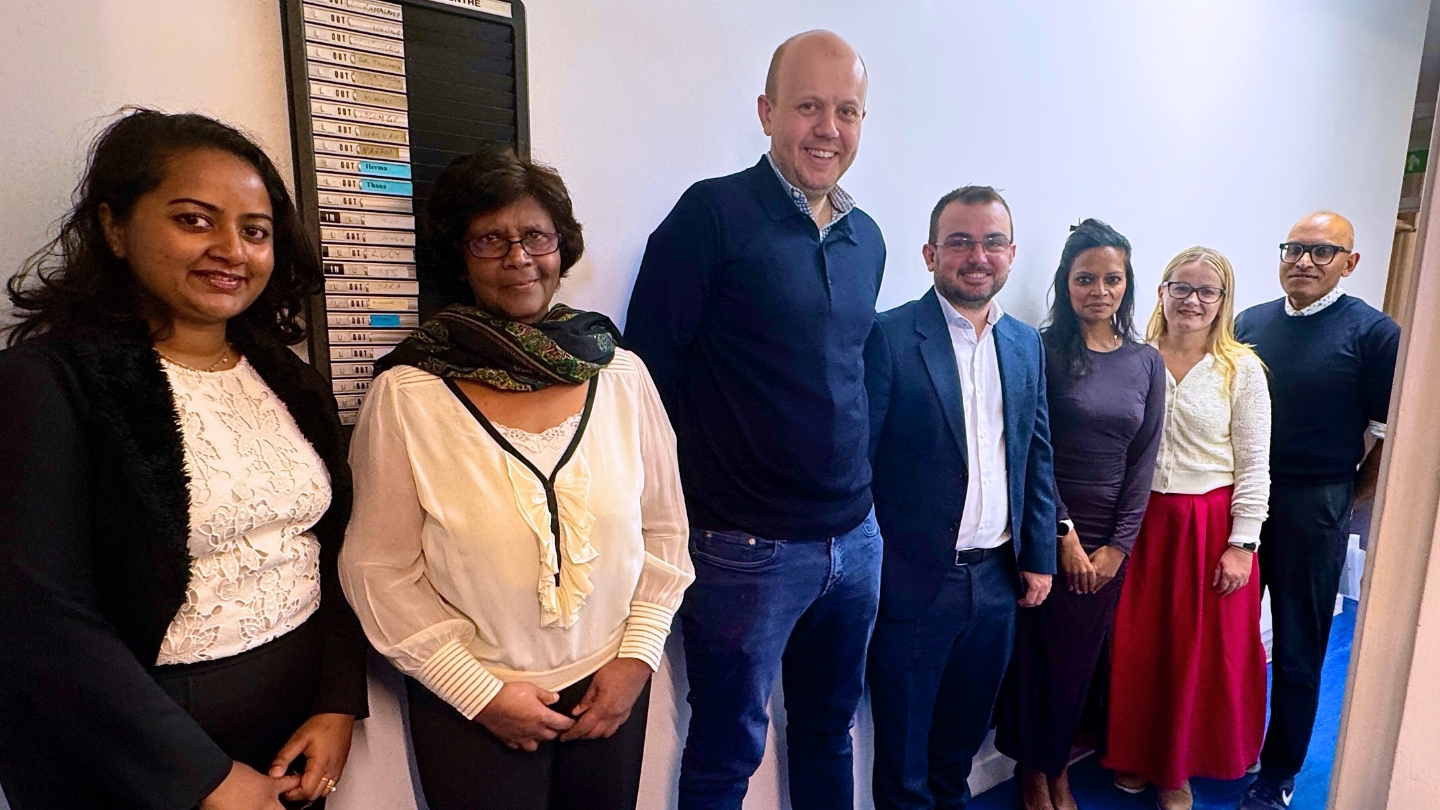
MP Joe Powell C's the Signs in Kensington
Earlier this month, Joe Powell, Member of Parliament for Kensington and Bayswater, visited Golborne Medical Centre to see how local GPs are using C the Signs.
Hosted by Dr Meena Nathan and Dr Thushara Goonewardene, the visit brought together community clinicians, C the Signs Co-Founder Dr Miles Payling, and local leaders to explore how innovation, teamwork, and community engagement are transforming early diagnosis in one of London’s most diverse communities.
Transforming Early Diagnosis in Primary Care
Inside the busy surgery, clinicians demonstrated how C the Signs supports decision-making in real time - analysing patient records, symptoms, and risk factors to surface hidden indicators of cancer during routine appointments.
“We’re still early in the rollout, but already it’s helping us prioritise patients who might otherwise slip through the cracks,” one clinician shared.
C the Signs’ AI models - validated across more than 500,000 patient records - have achieved 99% sensitivity for cancer detection and 94% accuracy in predicting tumour origin. In real-world NHS evaluations, practices using C the Signs have seen a 50% reduction in emergency cancer diagnoses and a 20–50% improvement in time to diagnosis.
Discussions during the visit focused on addressing barriers such as low screening uptake and under-detection in harder-to-spot cancers like pancreatic and lung - areas where C the Signs’ AI-driven case finding is already being deployed across the NHS.
Community, Compassion and Continuity
Beyond technology, clinicians emphasised the human side of early diagnosis.
One GP described how her team intervened when a patient’s surgery was nearly cancelled due to language barriers:
“She came in completely distraught. We stepped in, made the calls, got her rebooked. That kind of support takes time - but it changes everything.”
The Golborne team highlighted how community partnerships and culturally sensitive communication remain critical to ensuring that early diagnosis reaches every patient.
“It all starts with education,” said another clinician. “We saw what community groups achieved during the pandemic - those links still exist, but time is our biggest limitation.”
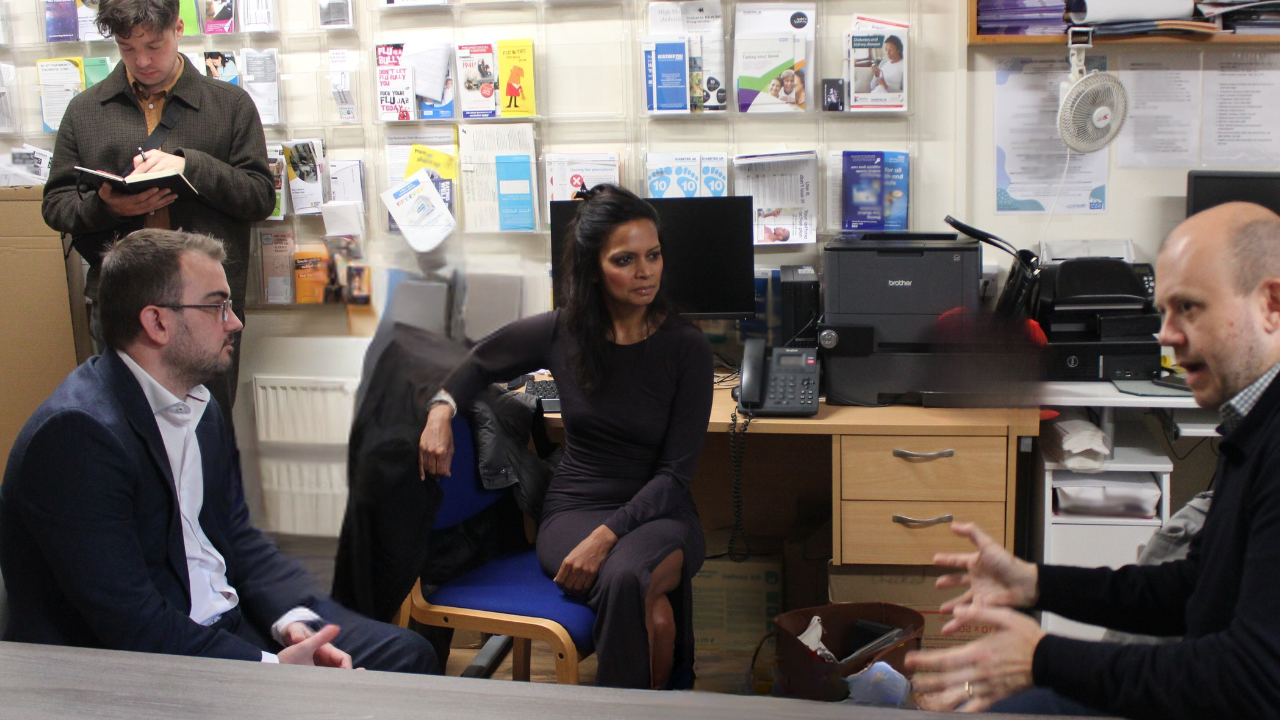
Facing the Pressures in Primary Care
The visit also revealed the realities of delivering proactive, preventative care in a high-demand urban setting. With limited space, the team frequently repurposes rooms - even corridors - to ensure every patient is seen. Expansion plans are already underway to increase clinical capacity next year.
Despite these pressures, Golborne’s clinicians continue to innovate, integrating mental health support, opportunistic health checks, and early-diagnosis prompts into every consultation.
“Our patients work with us,” said a member of the Golborne team. “They know we’re doing our best - and they appreciate that.”
Partnership Beyond the Practice
Speaking after the visit, Joe Powell MP emphasised the importance of collaboration between community, technology, and health services:
“What’s happening here in Golborne - between GPs, community groups, and innovators like C the Signs - is exactly the kind of joined-up approach we need to deliver earlier diagnosis and better care.”
He also called for stronger links across the Integrated Care Board (ICB) and better alignment between voluntary and statutory services to tackle the wider determinants of health - from housing to mental wellbeing.
Dr Miles Payling, Co-Founder and Chief Scientific Officer at C the Signs, added:
“Early diagnosis begins in communities - in everyday conversations between GPs and patients, supported by technology that empowers those moments. Every 22 minutes, C the Signs helps detect another patient with cancer. What’s happening in Golborne shows how innovation can give patients back the one thing cancer takes away: time.”
Why It Matters
C the Signs was built by NHS doctors to work within existing systems and integrate seamlessly with primary-care workflows. Today, it is commissioned in over 1,500 GP practices, covering more than 10 million patient lives across the UK.
By enabling faster, more accurate triage and supporting clinicians at the point of care, the platform is redefining how cancer is detected - turning complex data into actionable insight and giving every patient a better chance of being seen in time.
.webp)
Why Early Cancer Diagnosis Matters
Cancer touches nearly every life, yet its outcome can change dramatically depending on one thing: how early it’s found.
At C the Signs, our mission is to make sure no patient faces a late cancer diagnosis. By helping clinicians detect cancer sooner, we can give every person the best chance of survival.
The Power of Early Diagnosis
When cancer is diagnosed early, treatment is simpler, recovery is quicker, and survival rates are dramatically higher.
In fact:
- Patients diagnosed at Stage 1 are up to three times more likely to survive than those diagnosed at Stage 4.
- For some cancers, such as bowel and breast cancer, early detection can mean survival rates of over 90%.
- The NHS estimates that over 55,000 lives could be saved each year in the UK through earlier diagnosis.
Yet, despite these numbers, nearly half of all cancers are still diagnosed at a later stage.
That’s where technology and innovation must step in.
The Challenge: Subtle Signs, Complex Pathways
Detecting cancer early isn’t always straightforward.
In primary care, GPs see hundreds of patients every week - many presenting with symptoms that could be caused by a wide range of conditions.
Fatigue, unexplained weight loss, persistent cough - they might be harmless, or they might be the first signs of cancer.
With over 200 different types of cancer, each with unique presentations, it’s easy to see how even experienced clinicians face uncertainty.
The traditional diagnostic process can be complex and time-consuming - but with AI-powered tools like C the Signs, we can help clinicians navigate those complexities in seconds.

How C the Signs Supports Early Diagnosis
C the Signs uses artificial intelligence and clinical research to help healthcare professionals identify cancer risk at the earliest opportunity.
It analyses combinations of symptoms, risk factors, demographics, and clinical data to highlight when a patient may need urgent testing or referral.
By integrating seamlessly with GP systems such as EMIS, SystmOne, and Vision, C the Signs supports faster, evidence-based decisions - right there in the consultation. Every time a clinician uses C the Signs, they’re helping to catch cancer earlier, speed up treatment, and improve outcomes.
Real Impact, Real Lives
Behind every early diagnosis is a patient who gets to start treatment sooner - and a family that gets to hold on to more time.
From NHS practices to Cancer Alliances across the UK, C the Signs is helping to make that difference daily.
GPs using the platform have seen:
- Increases in timely referrals,
- Improvements in diagnostic accuracy, and
- Greater confidence in identifying patients at risk.
Early diagnosis isn’t just a metric - it’s a moment that can change a life.
Working Towards a Shared NHS Goal
The NHS Long Term Plan sets an ambitious target:
By 2028, 75% of cancers should be diagnosed at Stage 1 or 2.
C the Signs is proud to support this national mission by equipping GPs and healthcare professionals with the tools they need to meet it.
By combining clinical expertise with AI, we’re helping transform early diagnosis from an aspiration into a reality.
Every Early Diagnosis Starts with Action
Every consultation is a chance to change a life.
By acting on subtle symptoms and supporting clinical decision-making, C the Signs empowers clinicians to make earlier, more confident diagnoses.
“Because when cancer is found early, we don’t just treat a disease - we save a future.”
Learn More
👉 Discover How C the Signs Works - explore our AI-powered approach to early diagnosis.
👉 Read The Story Behind C the Signs - our journey to change the future of cancer care.
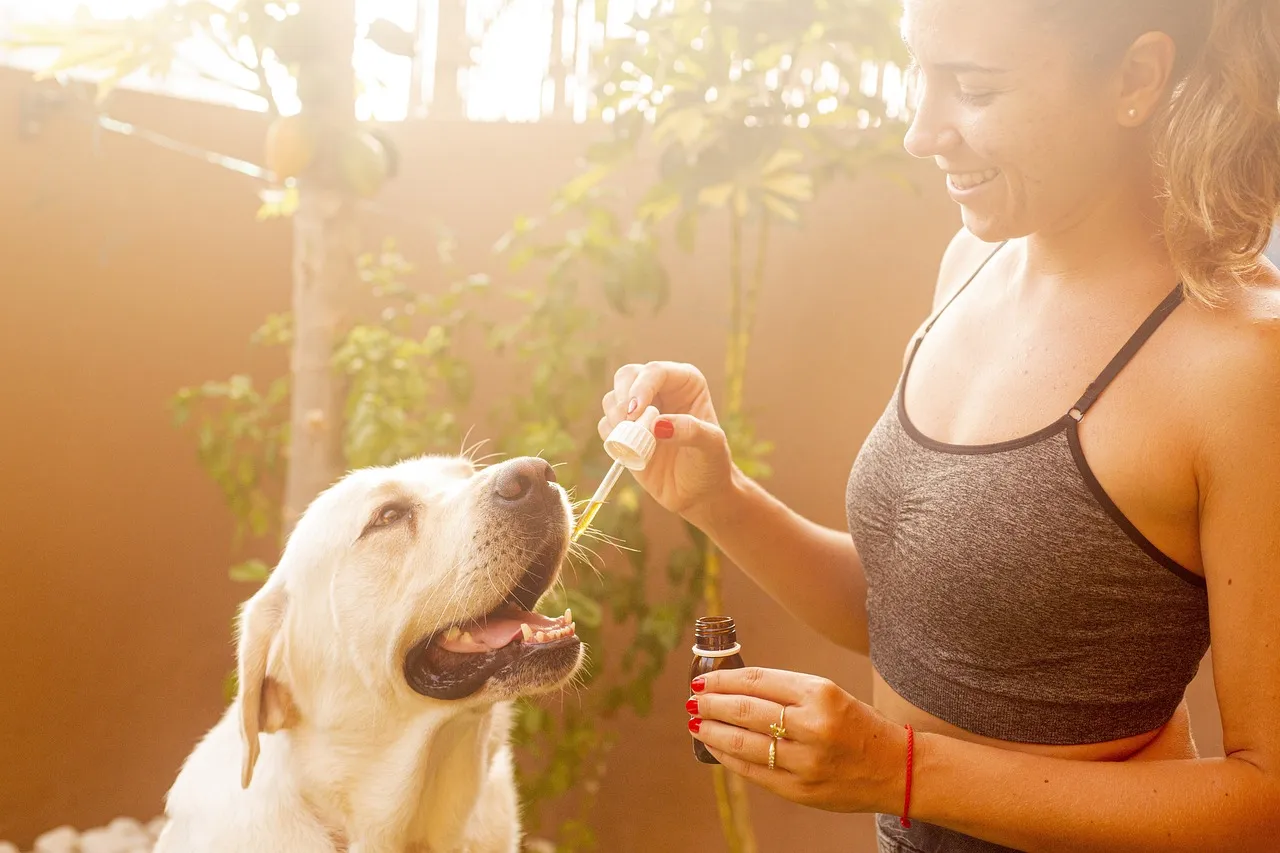
Can Cannabis Cure Cancer?
Conversations about cannabis and cancer are everywhere, from news stories to social media. For some, cannabis represents hope, for others, confusion. What’s clear is that research is still catching up with public interest.
So, what do we actually know about cannabis, its components, and its potential role in cancer care?
What is cannabis?
Cannabis is a plant that has been used for thousands of years, both recreationally and medicinally. The resin it produces contains cannabinoids, chemical compounds that can interact with the human body.
Two of the main cannabinoids are:
- Delta-9-tetrahydrocannabinol (THC) - the compound that causes a “high.”
- Cannabidiol (CBD) - which doesn’t cause a high and is legal in the UK when sold without THC.
The human body naturally produces its own cannabinoids, known as endocannabinoids, which help regulate processes such as appetite, mood and pain. This system is complex and continues to be studied, including how it may relate to certain diseases, cancer among them.
The legal status in the UK
Cannabis remains a Class B drug under UK law, meaning it’s illegal to possess or supply it. However, several prescribed medicines derived from cannabis are approved for use in the NHS, including:
- Nabilone, used to help control nausea and vomiting caused by chemotherapy.
- Epidyolex, used to treat certain types of severe epilepsy.
These are highly regulated medicines, prescribed only when other treatments haven’t worked.
CBD products, such as oils, drops, or gummies, are legal to buy in the UK if they contain no THC and are marketed as food supplements. They cannot legally claim to treat or prevent disease.
What about cannabis oil?
Cannabis oil products vary widely. Some contain only CBD, while others, often sold illegally, include THC. Pure CBD oil is legal to buy as a food supplement in the UK, but products sold online or in shops are not medicines and are not regulated for quality or content.
People living with cancer sometimes explore CBD oil to help with pain, anxiety or sleep. However, claims that CBD or cannabis oil can cure or shrink cancer are not supported by scientific evidence.
If a patient wishes to try CBD, they should always speak to their GP, pharmacist or cancer care team first - especially as CBD can interact with other prescribed medicines.
Cannabis and cancer: what the evidence shows
Researchers around the world have been studying cannabinoids and their potential role in cancer treatment. The results have been mixed and mostly early stage.
Some laboratory studies show that cannabinoids can:
- Trigger cancer cells to die (a process called apoptosis).
- Slow the growth of certain cancer cells.
- Prevent tumours from forming new blood vessels.
However, other studies have found that cannabinoids can:
- Damage healthy blood vessels.
- Sometimes promote cancer cell growth under certain conditions.
It’s also important to note that most of this research has been done in cells in the lab or in animals, not in people. What works in a petri dish doesn’t always translate into safe or effective treatments for patients.
As of 2025, there is no reliable clinical evidence that cannabis or cannabinoids can treat or cure cancer in humans.
What the research is exploring
Recent trials are beginning to look at cannabinoids in controlled, medical settings. These studies focus mainly on symptom control or exploring whether cannabinoids can be safely combined with standard treatment - not on replacing proven therapies.
Medicinal cannabis for symptom control in advanced cancer (2025)
A randomised, double-blind clinical trial tested a cannabis oil against placebo in patients with advanced cancer. The trial found no difference in overall symptom distress, though some patients reported a small reduction in pain. However, this came with higher rates of side effects such as dizziness and fatigue, highlighting the need for further research into safe dosing.
(Hardy et al., 2025).
The ARISTOCRAT trial – UK, ongoing
The ARISTOCRAT trial, led by the University of Leeds and the University of Birmingham, is testing nabiximols (Sativex), a balanced THC:CBD oral spray, alongside standard chemotherapy for people with recurrent glioblastoma. Early data suggests the treatment is well tolerated. The study aims to understand whether adding cannabinoids could improve survival.
(University of Leeds, 2021; The Brain Tumour Charity, 2023; BMC Cancer trial protocol, University of Birmingham, 2023)
Together, these studies show that research is progressing, but there is still no clear evidence that cannabinoids improve cancer outcomes.
What we still need to understand
There are still important questions to answer:
- Which cannabinoids (natural or synthetic) might be most effective?
- What doses are safe and meaningful?
- Which cancer types, if any, might respond?
- How do cannabinoids interact with existing treatments like chemotherapy or immunotherapy?
Until large, well-controlled clinical trials can answer these questions, cannabis cannot be recommended as a cancer treatment.
The bottom line
There’s currently no reliable evidence that cannabis or cannabis oil can treat or cure cancer.
Some cannabinoids may help manage symptoms such as pain, sickness or appetite loss, but always under clinical supervision.
For anyone considering CBD or cannabis-based products, the safest step is to talk to a GP or oncology specialist first. They can help review what’s evidence-based, what’s safe, and what may interfere with ongoing treatment.
Because every informed choice, and every early conversation,gives patients back control, confidence and clarity.
References
Hardy JR, Greer RM, Pelecanos A, et al. (2025). Medicinal cannabis for symptom control in advanced cancer: a double-blind, placebo-controlled, randomised clinical trial of 1:1 tetrahydrocannabinol and cannabidiol. Supportive Care in Cancer. DOI: 10.1007/s00520-025-09763-5
University of Leeds (2021). World-first trial tests cannabis-based drug on aggressive brain tumours. Leeds.ac.uk
The Brain Tumour Charity (2023). ARISTOCRAT: a pioneering trial using a cannabinoid-based drug to treat brain tumours. thebraintumourcharity.org
University of Birmingham (2023). A randomised phase II trial of temozolomide with or without cannabinoids in patients with recurrent glioblastoma (ARISTOCRAT). BMC Cancer protocol. birmingham.ac.uk
Cancer Research UK (2023). Cannabinoids and cancer: what we know. news.cancerresearchuk.org
Featured
Cancer in Numbers: Why Interception Matters with Dr Miles Payling
At the inaugural C the Signs Conference, Dr Miles Payling - Co-Founder and Chief Scientific Officer - delivered a message that captured the spirit of the movement redefining how the world detects cancer.
In a talk that fused science with humanity, he spoke not only about technology, but about time and how every second counts in the journey to early diagnosis.
“We can’t afford to wait for symptoms to become obvious. Every moment matters - because every moment lost is a choice, a treatment, a life that could have been saved.”
The Why - Where It All Began
Miles began with the story that shaped C the Signs’ mission. As an NHS doctor, he met a patient named Joe - fit, active, and 60 years old. After several GP visits with vague symptoms, Joe arrived at A&E jaundiced and weak. Scans confirmed metastatic pancreatic cancer. Three weeks later, Joe died.
“Joe never asked, why do I have cancer? What he asked was, why was my cancer picked up so late?”
That single question became the foundation of C the Signs - a platform designed to detect cancer early enough to change the outcome .
Today, that vision saves time and lives - with a patient with cancer detected every 22 minutes.
Why Early Detection Still Fails Too Many
Cancer remains the leading cause of death in the UK, with survival determined by the stage at diagnosis.
For breast cancer, five-year survival is 97.9 % at stage 1 but just 26.2 % at stage 4.
For bowel cancer, it falls from 91.7 % to 10.3 % .
Yet only 58.7 % of patients are diagnosed at early stages .
In primary care - where 90 % of all NHS patient contact takes place - GPs face impossible pressures: 10-minute consultations, thousands of patients, and on average just eight new cancer diagnoses a year .
“The problem isn’t people. It’s knowledge. We need to give every GP the power of precision - instantly.”
The Innovation - Redefining What’s Possible
C the Signs is an AI-powered, pan-cancer platform integrated directly with electronic health records. In under 30 seconds, it assesses risk, predicts tumour origin, and guides clinicians to the right diagnostic pathway across 100+ cancer types.
Real-world evaluations across the NHS have shown:
- 99 % sensitivity - finding nearly all patients with cancer
- 99 % negative predictive value - safely ruling out risk
- 94 % accuracy in predicting tumour origin
- 50 % reduction in emergency cancer presentations
- 21 % faster time-to-diagnosis - from 85 days to 67 days
Each figure represents a human life identified earlier, a family spared uncertainty, and a system made stronger.
The Movement - Honouring Jess’s Rule
Miles closed his speech by reflecting on Jessica Brady’s story - a 27-year-old whose symptoms were missed, leading to a late diagnosis and preventable loss .
To honour her legacy, C the Signs is implementing “Jess’s Rule” - a feature that automatically alerts clinicians when a patient presents three times or more with unresolved symptoms, and triggers a cancer risk assessment .
“We can turn tragedy into transformation - by ensuring that no patient is ever overlooked again.”
Together, we can make early cancer detection a standard for all, not a privilege for some - and give every person the time they deserve.
Newsroom
.webp)
How C the Signs Integrates with EMIS and SystmOne to Save Lives
In primary care, time matters. Every consultation, every click, and every decision can shape a patient’s outcome - especially when it comes to cancer.
That’s why C the Signs has been designed to integrate seamlessly with EMIS and SystmOne, enabling GPs to detect cancer earlier without adding extra steps to their daily workflow.
Integration That Fits Naturally Into Primary Care
For most GPs, EMIS and SystmOne are the backbone of daily practice - holding every patient’s medical history, symptoms, and risk factors. C the Signs connects directly into these systems, transforming that information into real-time, actionable insight.
Through this integration, clinicians can:
- Instantly access C the Signs from within EMIS or SystmOne
- Automatically analyse patient symptoms, demographics, and clinical data
- Receive immediate, evidence-based guidance on cancer risk and next steps
No extra software. No switching screens. No duplicate data entry. Just faster, smarter decision-making - at the point of care.
Reducing the Time to Diagnosis
C the Signs is built to make early diagnosis simple, safe, and scalable. By embedding directly into the GP’s existing system, it eliminates delays that often occur when technology sits outside the electronic medical record.
This seamless workflow means:
- Referrals can be generated instantly, including under the Faster Diagnosis Standard (FDS), formerly known as the two-week wait (2WW).
- Patient data flows automatically, avoiding missed information or transcription errors.
- Audit trails and outcomes are logged for research, safety, and quality improvement.
In practices where C the Signs is live, clinicians are already finding cancer faster and more accurately - with earlier referrals, improved outcomes, and a reduced administrative burden.
Driving Early Diagnosis Across the NHS
C the Signs integrates directly with:
- EMIS Web - used by around 70% of GP practices in England
- SystmOne - supporting thousands of GP practices, community services, and hospitals
Together, these integrations make the platform available to millions of patients across the NHS — turning data into action and ensuring that every GP, regardless of location, has access to the same level of intelligent support.
Seamless, Safe, and Clinically Validated
Every integration is developed and maintained in line with:
- NHS Digital standards
- Clinical Safety DCB0129/0160 accreditation
- Information Governance and GDPR compliance
This ensures that C the Signs operates to the highest standards of clinical safety, patient privacy, and system performance — delivering technology clinicians can trust.
Real Impact, Real Patients
“The ability to use C the Signs directly in EMIS has completely changed how quickly I can act.
I can review a patient’s symptoms, get the cancer risk assessment instantly, and make the referral — all in one place.”
— GP, South East England
Every integration helps remove barriers between data and diagnosis - giving clinicians back time and patients back their best chance of survival.
About C the Signs
C the Signs is an AI-powered clinical platform that helps healthcare professionals identify patients at risk of cancer earlier, faster, and more accurately.
Founded by NHS doctors, the platform analyses over 100 cancer types using evidence-based algorithms and integrates directly into GP workflows through EMIS, SystmOne, and Vision.
By embedding early detection tools into everyday care, C the Signs is helping achieve the NHS’s ambition:
75% of cancers diagnosed at stage 1 or 2 by 2028.
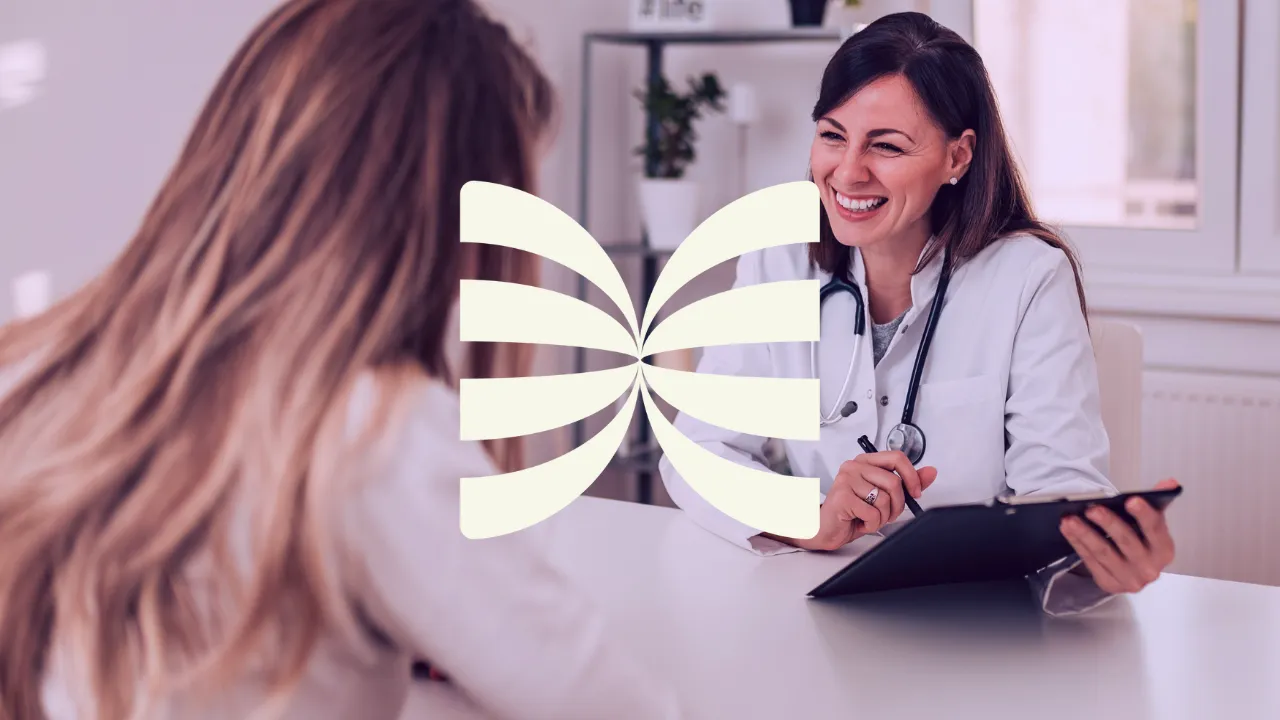
How Does C the Signs Work?
Every minute counts when it comes to cancer.
For most patients, early detection means faster treatment, better outcomes, and more lives saved.
Yet for GPs, recognising which of the thousands of daily symptoms could indicate cancer isn’t simple. That’s where C the Signs comes in - an AI-powered clinical platform that helps healthcare professionals identify patients at risk of cancer earlier, faster, and more accurately.
The Challenge: Spotting the Earliest Signs of Cancer
Cancer rarely looks the same twice. Two patients with the same disease can present in completely different ways - fatigue in one, back pain in another.
With over 100 cancer types and countless symptom combinations, even the most experienced GP can face uncertainty.
Traditional guidelines can be fragmented or difficult to navigate in a busy primary care setting.
C the Signs bridges that gap - bringing together national guidance, clinical research, and local pathways into one intelligent platform that supports decision-making in real time.
The Solution: AI-Driven Clinical Support
C the Signs analyses patient data, demographics, risk factors, and symptoms to calculate the probability of cancer - then guides the GP to the right next step.
It doesn’t replace clinical judgement.
It enhances it.
Here’s how it works in real time:
- Input – The GP enters symptoms, risk factors, or test results directly within EMIS, SystmOne, or Vision.
- Analyse – The platform’s AI interprets this data using national guidelines, research evidence, and validated clinical pathways.
- Act – Within seconds, C the Signs provides a clear recommendation - suggesting the most appropriate referral, investigation, or next action, tailored to each individual patient.
Everything happens seamlessly, within the GP’s existing workflow - saving valuable time and ensuring no symptom is overlooked.

Built on Evidence, Backed by Research
C the Signs doesn’t guess - it’s grounded in science.
Our algorithms are validated against national cancer guidelines and peer-reviewed research, and informed by real-world data from NHS England partners, Cancer Alliances, and Health Innovation Networks.
Every insight is continually refined through clinical feedback and new evidence, ensuring the platform remains aligned with the most up-to-date pathways in early diagnosis.
Seamless Integration with NHS Systems
Time is one of the most valuable resources in primary care.
That’s why C the Signs integrates directly with EMIS, SystmOne, and Vision, requiring no extra logins or manual data entry.
The platform works where GPs already work, making early detection faster, simpler, and more efficient.
Improving Early Detection Across the NHS
C the Signs is now used by over 10,000 healthcare professionals across 1,500 GP practices, supporting early cancer detection nationwide.
Independent evaluations and NHS-led studies have shown that practices using C the Signs achieve:
- Higher rates of two-week-wait referrals
- Faster time to diagnosis (a 21% reduction in diagnostic delays)
- More cancers diagnosed in primary care
- Fewer emergency presentations
By identifying patients earlier, C the Signs is helping the NHS move closer to its 2028 ambition - diagnosing 75% of cancers at stage 1 or 2.
Supporting Clinicians. Empowering Patients.
C the Signs is more than a platform - it’s a partner in early diagnosis.
By giving clinicians the confidence to act on subtle patterns and helping patients reach testing sooner, we’re redefining what’s possible in cancer care.
“Every early diagnosis is a life changed - and that’s what drives us.”
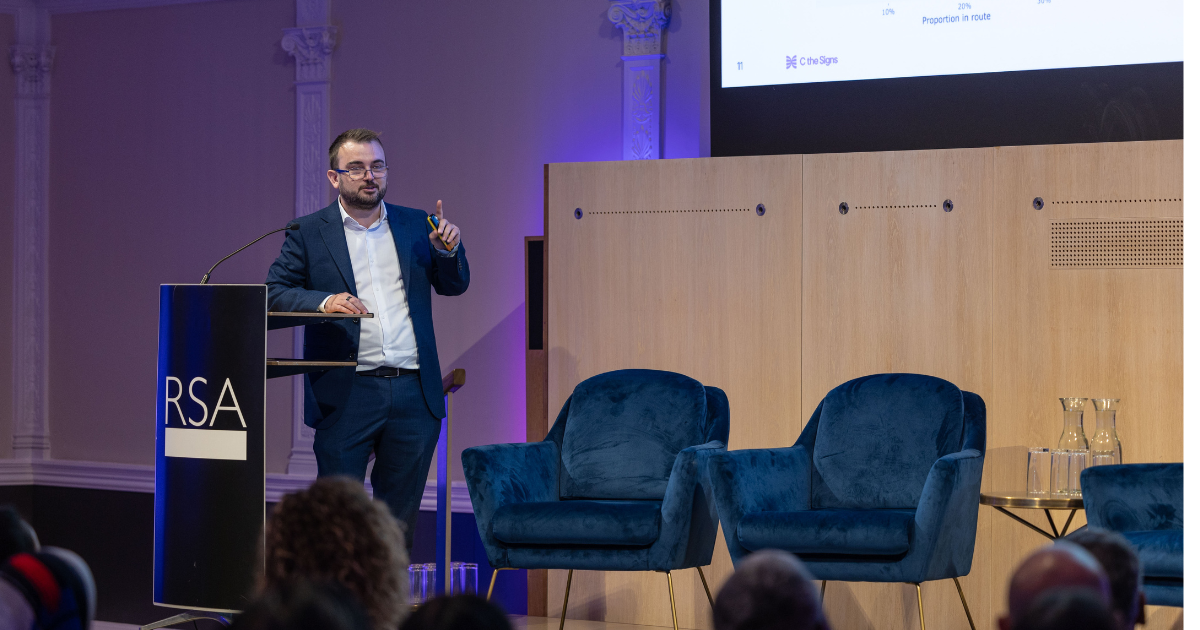
Cancer in Numbers: Why Interception Matters with Dr Miles Payling
At the inaugural C the Signs Conference, Dr Miles Payling - Co-Founder and Chief Scientific Officer - delivered a message that captured the spirit of the movement redefining how the world detects cancer.
In a talk that fused science with humanity, he spoke not only about technology, but about time and how every second counts in the journey to early diagnosis.
“We can’t afford to wait for symptoms to become obvious. Every moment matters - because every moment lost is a choice, a treatment, a life that could have been saved.”
The Why - Where It All Began
Miles began with the story that shaped C the Signs’ mission. As an NHS doctor, he met a patient named Joe - fit, active, and 60 years old. After several GP visits with vague symptoms, Joe arrived at A&E jaundiced and weak. Scans confirmed metastatic pancreatic cancer. Three weeks later, Joe died.
“Joe never asked, why do I have cancer? What he asked was, why was my cancer picked up so late?”
That single question became the foundation of C the Signs - a platform designed to detect cancer early enough to change the outcome .
Today, that vision saves time and lives - with a patient with cancer detected every 22 minutes.
Why Early Detection Still Fails Too Many
Cancer remains the leading cause of death in the UK, with survival determined by the stage at diagnosis.
For breast cancer, five-year survival is 97.9 % at stage 1 but just 26.2 % at stage 4.
For bowel cancer, it falls from 91.7 % to 10.3 % .
Yet only 58.7 % of patients are diagnosed at early stages .
In primary care - where 90 % of all NHS patient contact takes place - GPs face impossible pressures: 10-minute consultations, thousands of patients, and on average just eight new cancer diagnoses a year .
“The problem isn’t people. It’s knowledge. We need to give every GP the power of precision - instantly.”
The Innovation - Redefining What’s Possible
C the Signs is an AI-powered, pan-cancer platform integrated directly with electronic health records. In under 30 seconds, it assesses risk, predicts tumour origin, and guides clinicians to the right diagnostic pathway across 100+ cancer types.
Real-world evaluations across the NHS have shown:
- 99 % sensitivity - finding nearly all patients with cancer
- 99 % negative predictive value - safely ruling out risk
- 94 % accuracy in predicting tumour origin
- 50 % reduction in emergency cancer presentations
- 21 % faster time-to-diagnosis - from 85 days to 67 days
Each figure represents a human life identified earlier, a family spared uncertainty, and a system made stronger.
The Movement - Honouring Jess’s Rule
Miles closed his speech by reflecting on Jessica Brady’s story - a 27-year-old whose symptoms were missed, leading to a late diagnosis and preventable loss .
To honour her legacy, C the Signs is implementing “Jess’s Rule” - a feature that automatically alerts clinicians when a patient presents three times or more with unresolved symptoms, and triggers a cancer risk assessment .
“We can turn tragedy into transformation - by ensuring that no patient is ever overlooked again.”
Together, we can make early cancer detection a standard for all, not a privilege for some - and give every person the time they deserve.

Mayo Clinic Magazine Highlights C the Signs’ Impact on Early Cancer Diagnosis
We’re proud to share that Mayo Clinic Magazine has published an in-depth feature on C the Signs, spotlighting our journey, scientific breakthroughs, and mission to transform how cancer is diagnosed - globally.
Recognition from one of the world’s most respected medical institutions marks a new chapter in our mission to drive earlier detection, better outcomes, and a future where no patient is diagnosed too late.
A Story That Resonates
The feature, titled “C the Signs: Building digital solutions to find cancer up to five years sooner,” takes readers inside the origins and innovation behind our platform.
It begins with the story of Dr Bea Bakshi, who, after witnessing a patient’s late pancreatic cancer diagnosis during her time as an NHS doctor, was driven to ask a single question:
“What if we could help doctors spot the earliest signs of cancer - before it’s too late?”
From that question came the foundation for C the Signs - and the start of a new approach to early diagnosis.
The Mayo Clinic piece explores:
- How our AI models have been developed to detect patterns across multiple tumour types
- Our “closed-loop learning” system, which continuously refines itself with every patient interaction
- And our collaboration with Mayo Clinic’s Platform_Accelerate programme, enabling retrospective validation against diverse US patient datasets
One of the most powerful findings: in retrospective analysis, C the Signs identified cancers up to five years earlier in 26% of patients across the five highest-mortality cancer types - breast, colorectal, lung, prostate, and pancreatic.
That kind of lead time doesn’t just change statistics.
It changes lives. As our Co-Founder and CEO, Bea shared with Mayo Clinic:
“We’ve detected over 65,000 patients with cancer in the UK. In five years’ time, I want to be talking about the number of patient lives we’ve saved in the United States.”
Defying Time. Rewriting the Possible.
Our collaboration with Mayo Clinic reflects the next phase of our mission - building a future where early detection is standard for all, not a privilege for some.
Every earlier diagnosis is a life changed.
And every life changed redefines what’s possible.
-
Photography by Lincoln Gore / Mayo Clinic
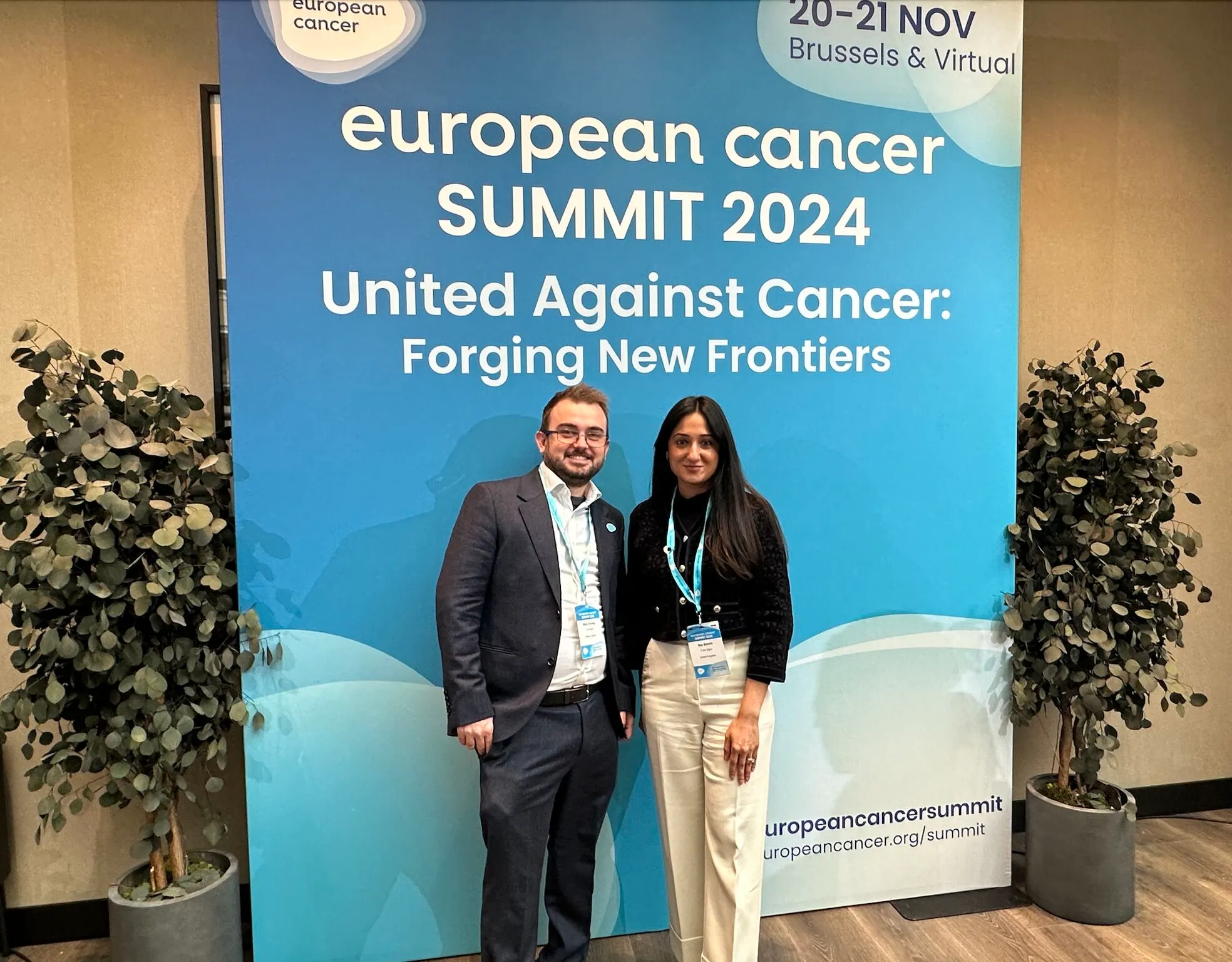
A Year of Impact: Reflections on 2024 from Dr Bea Bakshi, CEO of C the Signs
As 2024 draws to a close, it feels like the right moment to pause and reflect on what has been an extraordinary year for C the Signs - a year defined by our relentless pursuit of purpose and our shared mission to ensure that no patient faces a late cancer diagnosis.
This has been a year of measurable progress, meaningful partnerships, and, most importantly, real impact.
Transforming Lives Through Early Detection
In 2024, we reached remarkable milestones - completing over 400,000 cancer risk assessments and identifying more than 30,000 patients with cancer across 50+ cancer types.
Each number represents more than data. It represents a person whose cancer was found earlier, a family given more time, and a future rewritten.
These achievements bring us one step closer to our vision:
A world where every patient survives cancer.
Driving Research and Global Recognition
This year, our research was recognised on some of the world’s most influential scientific stages.
- At the ASCO General Meeting in Chicago, we shared findings demonstrating improved early cancer detection rates - without increasing healthcare utilisation.
- At the Early Detection of Cancer Conference in San Francisco, our data showed a 50% improvement in diagnostic speed.
- At the European Cancer Summit in Brussels, we presented evidence of significant stage shift in ovarian cancer, detecting cases earlier than ever before.
- And most recently, at the San Antonio Breast Cancer Symposium, we revealed breakthrough findings showing C the Signs identified women at risk of breast cancer up to five years earlier than physicians, in 20% of cases, with accuracy comparable to mammography.
Each of these studies reinforces the same truth:
When cancer is found earlier, lives can be transformed.
Our Defining Value: Impact
When I asked our team what single value defines C the Signs, one word came through clearly - impact.
That word guides every decision we make, every partnership we build, and every innovation we create.
It is the heartbeat of who we are - a team united by the belief that technology can restore something medicine too often loses: time.
Gratitude and Collaboration
None of this would be possible without the people who make our mission real.
To our exceptional team - your dedication, brilliance, and compassion inspire me every day.
To the clinicians we partner with across the NHS and beyond - thank you for your trust, courage, and unwavering commitment to your patients, often in the most challenging circumstances.
Together, we are proving that early detection isn’t just possible - it’s happening.
Looking Ahead to 2025
As we look to the year ahead, our mission remains as clear as ever:
to accelerate earlier cancer detection and to ensure every patient, everywhere, has access to the care they need, when they need it.
2025 will bring new challenges - but also new opportunities to scale our impact, deepen our partnerships, and expand the boundaries of what’s possible in early diagnosis.
From all of us at C the Signs, thank you for being part of this journey.
Wishing everyone a joyful holiday season and a bright New Year filled with hope, innovation, and lives transformed.
Defy time. Rewrite the possible.
—
Dr Bea Bakshi
Co-Founder & CEO, C the Signs
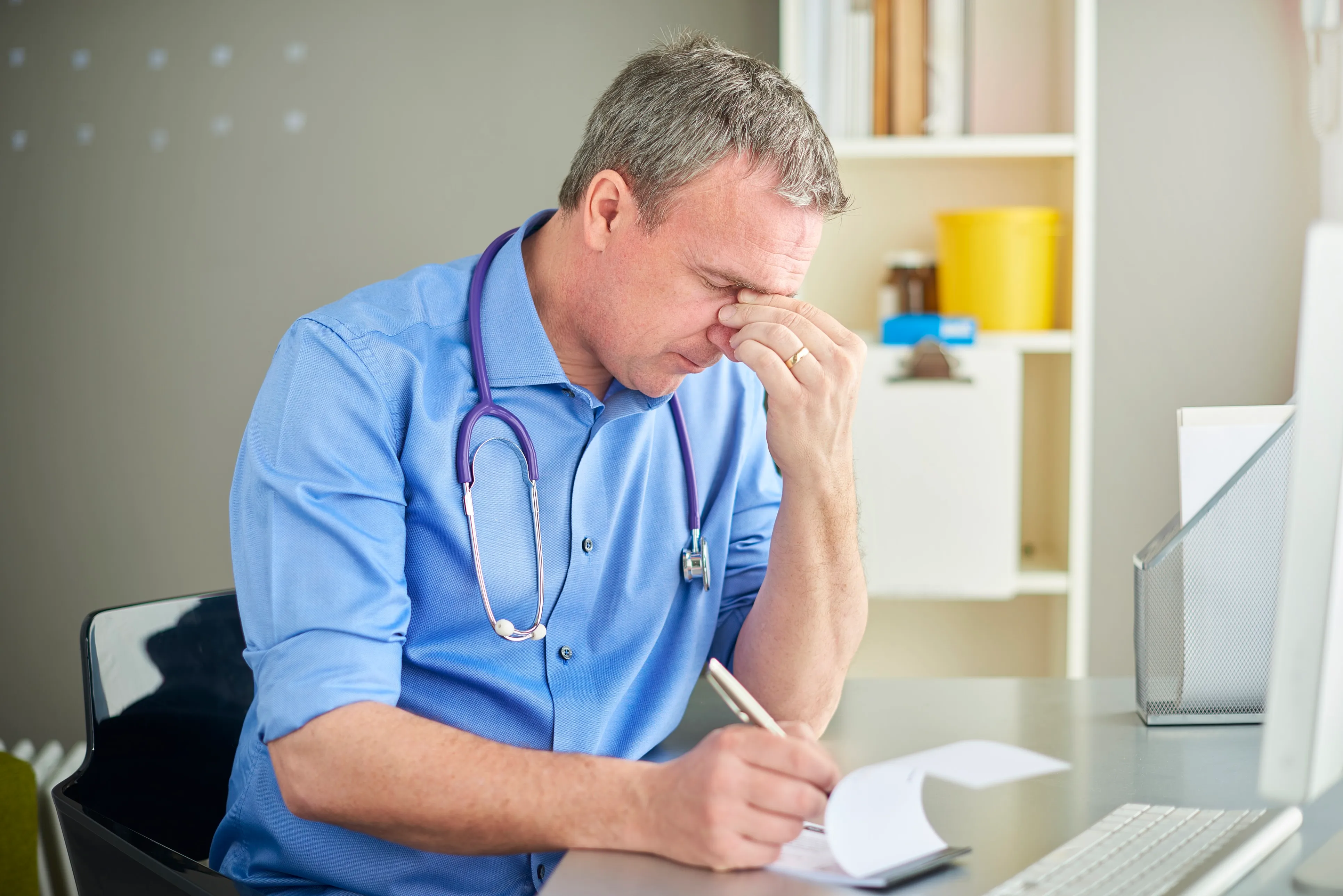
Lightening the Load: Addressing the Pressures on GPs in Diagnosing Cancer
Diagnosing cancer early is one of the greatest challenges faced by GPs. With vague and non-specific symptoms, a lack of time in consultations, large patient caseloads, and complex cancer guidelines, the burden on GPs is immense. Add to this the administrative pressures of coordinating referrals and ensuring diagnostic pathways are followed, all whilst making sure not to refer inappropriately, and it’s clear why early cancer detection is as emotionally taxing as it is critical.
In this environment, GPs are asked to do the near-impossible: spot subtle early signs of cancer that can easily be mistaken for more benign conditions—all within the constraints of a 10-minute appointment. For many, this balancing act takes a toll, contributing to stress, burnout, and the constant fear of missing a life-threatening diagnosis.
The High-Stakes Nature of Early Detection
Cancer’s early signs are notoriously difficult to pinpoint. Symptoms like fatigue, unexplained weight loss, or vague abdominal pain can overlap with countless other conditions. GPs must sift through these clues, often relying on incomplete information, and decide whether further investigation is warranted.
Adding to the pressure is the sheer volume of cases GPs handle daily. With limited time per patient, it’s easy for even experienced practitioners to feel overwhelmed by the weight of these decisions. And then there’s the administrative side: navigating referral systems, updating records, and ensuring compliance with national guidelines.
The stakes are incredibly high. Delays in diagnosis can lead to advanced-stage cancers, where treatment options are fewer, less effective, and more invasive. For patients, this can mean reduced survival chances. For GPs, the emotional burden of missed or delayed diagnoses is profound.
A Tool to Ease the Pressure: How C the Signs Supports GPs
While GPs shoulder this immense responsibility, C the Signs is stepping in to provide much-needed support. Rather than replacing the expertise of doctors, this AI-driven platform acts as a second pair of eyes, helping GPs identify cancer risks quickly and accurately.
C the Signs analyses a wide range of patient data—symptoms, demographics, and risk factors—and provides tailored diagnostic pathways within seconds. It alleviates the mental load of memorising extensive cancer guidelines, ensuring that no critical detail is overlooked. For GPs, this means faster, evidence-based decisions and more time to focus on their patients.
With enhanced patient safety-netting and safer workflows, C the Signs supports GPs in effectively monitoring patients who may be at risk of cancer, ensuring timely follow-ups and reducing the chances of missed or delayed diagnoses.
Proven Impact on Detection Accuracy
The platform’s impact speaks for itself. In a recent SNEE ICB study, C the Signs facilitated a 12.3% increase in cancer detection rates, whilst showing no notable increase in diagnostic or referral activities.
For GPs, this means fewer delays, less second-guessing, and a smoother pathway to getting their patients the care they need. For patients, it’s a matter of life and death—earlier diagnosis significantly increases survival rates and opens the door to less invasive treatments.
A Lifeline for GPs
By reducing the cognitive and administrative pressures of cancer detection, C the Signs is helping to combat the burnout that’s becoming all too common in primary care. GPs can work with greater peace of mind, confident that they’re making the best decisions for their patients.
Early cancer detection will always be a challenging aspect of primary care, but with C the Signs, GPs have a powerful ally. It’s not just about saving lives—it’s about supporting the people who dedicate their careers to doing so.
.webp)
C the Signs Launches Womb Cancer Self-Referral Service
Somerset, UK - August 2024
C the Signs, in partnership with Somerset NHS Foundation Trust, is proud to announce the launch of a pioneering new self-referral service designed to transform the early diagnosis of endometrial (womb) cancer.
Using artificial intelligence, women over 50 can now complete a quick, evidence-based assessment - and if there is any indication of cancer risk, they are triaged immediately and booked in for an ultrasound scan.
This UK-first pathway is accelerating earlier and faster detection in post-menopausal women - a group at higher risk of developing endometrial cancer.
Transforming Access to Early Diagnosis
Endometrial cancer is one of the most common cancers affecting women in the UK, with over 9,700 new cases diagnosed each year. When found early, five-year survival rates reach 90%. In the latest stages, that drops to just 15%.
The new AI-powered self-referral pathway allows women experiencing post-menopausal bleeding or other symptoms of womb cancer to refer themselves directly for testing - without needing to contact their GP first.
This streamlined approach ensures faster access to diagnostic services and helps women get the right care at the right time.
A Clinically-Led Approach to Earlier Detection
“People will be able to get a diagnosis much earlier than before,”
said David Milliken, Consultant Gynaecological Oncologist at Somerset NHS Foundation Trust.
“We are seeing a year-on-year increase in referrals to our gynaecology cancer services, particularly for post-menopausal bleeding. By allowing patients to access our service directly via self-referral, we can avoid unnecessary delays and get them an appointment much more quickly.”
Dr Milliken added:
“This will also free up GP colleagues so they can see patients with other conditions. More than nine out of every ten women referred to our service will not have cancer. We hope this service will help to reassure the majority more quickly — and identify those who need treatment sooner.”
Empowering Women with Faster Access and Reassurance
Women’s health has long faced barriers to timely diagnosis and equitable care.
Helen Hyndman MBE, Ask Eve Nurse Service Co-ordinator at The Eve Appeal, praised the initiative:
“C the Signs’ self-referral service empowers patients by raising awareness of the symptoms of womb cancer and offering those experiencing post-menopausal bleeding a quicker appointment, closer to home. This will help provide reassurance and should increase the chances of womb cancer being diagnosed earlier, offering better outcomes.”
AI Innovation Driving a New Standard of Care
This initiative marks a significant step forward for women’s health - not just in reducing delays, but in empowering women with knowledge and faster access to life-saving diagnostics.
By simplifying the route to diagnosis, C the Signs and Somerset NHS Foundation Trust are setting a new national standard for how patients can access cancer diagnostic services across the NHS.
Dr Jude Gordon, Clinical Director at C the Signs, explained:
“At C the Signs, our mission is to break down barriers to earlier and faster cancer diagnosis. By enabling women to take control of their health and assess their symptoms, we’re ensuring faster access to specialist services and the right care at the right time - increasing the chances of surviving cancer.”
Scaling Early Detection Across the NHS
This pathway is the first of several AI-enabled self-referral services being launched across the NHS.
C the Signs will soon expand the model to include pathways for colorectal (bowel) and lung cancer, furthering its mission to make early detection a standard for all, not a privilege for some.
Together with Somerset NHS Foundation Trust, C the Signs is advancing women’s health, improving equity of access, and giving more people the time and opportunity that early diagnosis provides.
Contact
To learn more about how C the Signs can accelerate cancer diagnosis in your region,
contact hello@cthesigns.com or visit cthesigns.com
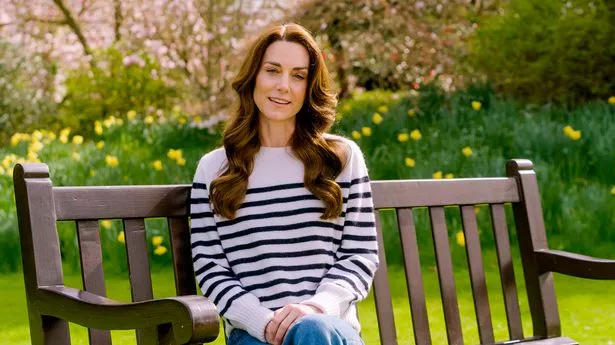
A Wake-Up Call For All of Us: How Princess Kate’s Bravery is Shifting Cancer Awareness
In the wake of Princess Kate's deeply personal revelation, disclosed amidst relentless scrutiny from the press following her absence from royal duties, we are reminded of the delicate balance between public life and private suffering.
Her disclosure, shared with a heavy heart, was not a choice freely made but a response to an untenable situation where the boundary of personal privacy was breached by widespread speculation. Princess Kate demonstrated unparalleled bravery and a profound sense of solidarity with those quietly enduring their battles with cancer.
This situation underscores a critical conversation about the sanctity of privacy and the broader implications for everyone navigating through a cancer diagnosis. The loss of privacy can often feel like a loss of control, a sentiment deeply resonant with those dealing with cancer. It eliminates the autonomy to choose how and when to confront one's vulnerabilities, adding an unnecessary burden during an already tumultuous time. Respecting someone's diagnosis means allowing individuals the dignity to face their illness on their terms, to maintain control over their narrative, and to protect their identity from being overshadowed by their diagnosis.
The forced unveiling of Princess Kate's cancer diagnosis highlights the intense pressure public figures often face, transforming what should be a deeply private matter into public discourse. However, the manner in which she chose to address this unwelcome spotlight offers us a moment for reflection and, ultimately, inspiration.
The revelation of her diagnosis at the age of 42, as a mother of three, challenges widespread misconceptions about who can be affected by this pervasive disease. It underscores the stark reality that 1 in 2 individuals will face a lifetime risk of cancer, with 1 in 10 new diagnoses occurring in the 25-49 age group, and women being twice as likely as men to be diagnosed within this bracket. These statistics highlight the indiscriminate nature of cancer and emphasise the critical need for increased awareness and early detection efforts.
By sharing her story, Princess Kate has built a bridge of solace and understanding with women, parents, and cancer patients everywhere, those who grasp the depth of her experience on a profoundly human level. It serves as a reminder that behind the titles, responsibilities, and expectations are individuals grappling with their vulnerabilities, fears, and the daunting journey of cancer treatment. The princess's situation underscores why many opt to navigate their illness in private—protecting not just their sense of self but also affording themselves the space to cope with the multifaceted challenges cancer brings without the additional burden of public scrutiny.
Princess Kate's openness serves as a rallying cry for solidarity and hope. It's a poignant reminder that cancer does not discriminate—it can affect anyone's life, regardless of age or status. Her courage in sharing her story should serve as a call to action, urging people to actively engage in their health by recognising symptoms, understanding risks, and promptly seeking medical advice when needed, thus offering an opportunity to demystify the disease and encourage open discussions about health and the importance of early detection.
As our hearts go out to Princess Kate and countless others on their personal cancer journeys, this moment invites us to reflect on the compassion, understanding, and respect we owe to one another, fostering a community where everyone feels supported in their time of need.
References:
Cancer Research UK - almost 10% of new cancer diagnoses in people aged 25-49
NHS - 1 in 2 people will get cancer at some point in their lifetime
.webp)
C the Signs Selected by the White House CancerX Accelerator
C the Signs has been selected as part of the inaugural White House CancerX Accelerator, a major U.S. initiative uniting global leaders in oncology, technology, and innovation to deliver on President Biden’s Cancer Moonshot vision - to reduce cancer mortality by 50% over the next 25 years.
This marks an extraordinary moment for C the Signs - and for the UK’s role in global healthcare innovation - as the only British company chosen among the 16 organisations forming the first CancerX Accelerator cohort.
Transforming Early Diagnosis on a Global Stage
Built within the NHS and founded by UK doctors, C the Signs is redefining how cancer is detected.
The platform uses artificial intelligence to help clinicians identify patients at risk of cancer at the earliest and most treatable stage.
So far, the system has:
- Identified over 25,000 patients with cancer,
- Achieved 98% accuracy in identifying risk, and
- Supported clinicians across 1,500+ GP practices in finding cancer faster and earlier.
Through the CancerX Accelerator, C the Signs joins forces with leading organisations including AstraZeneca, Intel, Dell Technologies, AWS, and UC Davis Health - forming part of a global collaboration dedicated to transforming the future of cancer care.
“A Pivotal Moment to Lead with Heart”
“As a doctor, I am deeply moved and profoundly grateful for our selection to participate in the inaugural CancerX Accelerator,” said Dr Bea Bakshi, CEO and Co-Founder of C the Signs.
“At C the Signs, our mission is rooted in the belief that early detection can change the course of this disease - aiming for a future where surviving cancer is the norm, not the exception. This is more than an opportunity; it’s a pivotal moment to lead with heart and create meaningful change.”
Recognising UK Leadership in Health Innovation
“This recognition is a testament to the UK’s leadership in healthcare innovation and our capacity to create technology solutions with a global impact,” said Aphrodite Spanou, Director of Healthcare UK at the Department of Health and Social Care, NHS England, and the Department for Business and Trade.
“C the Signs’ work in early cancer detection not only exemplifies British ingenuity but also demonstrates how local innovation can achieve international significance.”
Bringing Together AI and Oncology to Rewrite the Possible
The CancerX Accelerator provides a unique opportunity for cross-sector collaboration - connecting C the Signs with cancer experts, research networks, and innovation partners across the United States.
This partnership represents more than recognition; it’s the next step in scaling early cancer detection globally, combining UK clinical excellence with international innovation to help save lives worldwide.
About C the Signs
Founded by NHS doctors Dr Bea Bakshi and Dr Miles Payling, C the Signs is an AI-powered clinical platform that enables healthcare professionals to identify patients at risk of cancer earlier, faster, and more accurately.
Validated through peer-reviewed research and partnerships with NHS England, Health Innovation Networks, and now the White House CancerX Accelerator, C the Signs continues to redefine what’s possible in early cancer detection - giving people back time, choice, and life.
📢 Read more about the White House CancerX Accelerator: https://cancerx.health/accelerator
🌐 Learn more about C the Signs: www.cthesigns.com
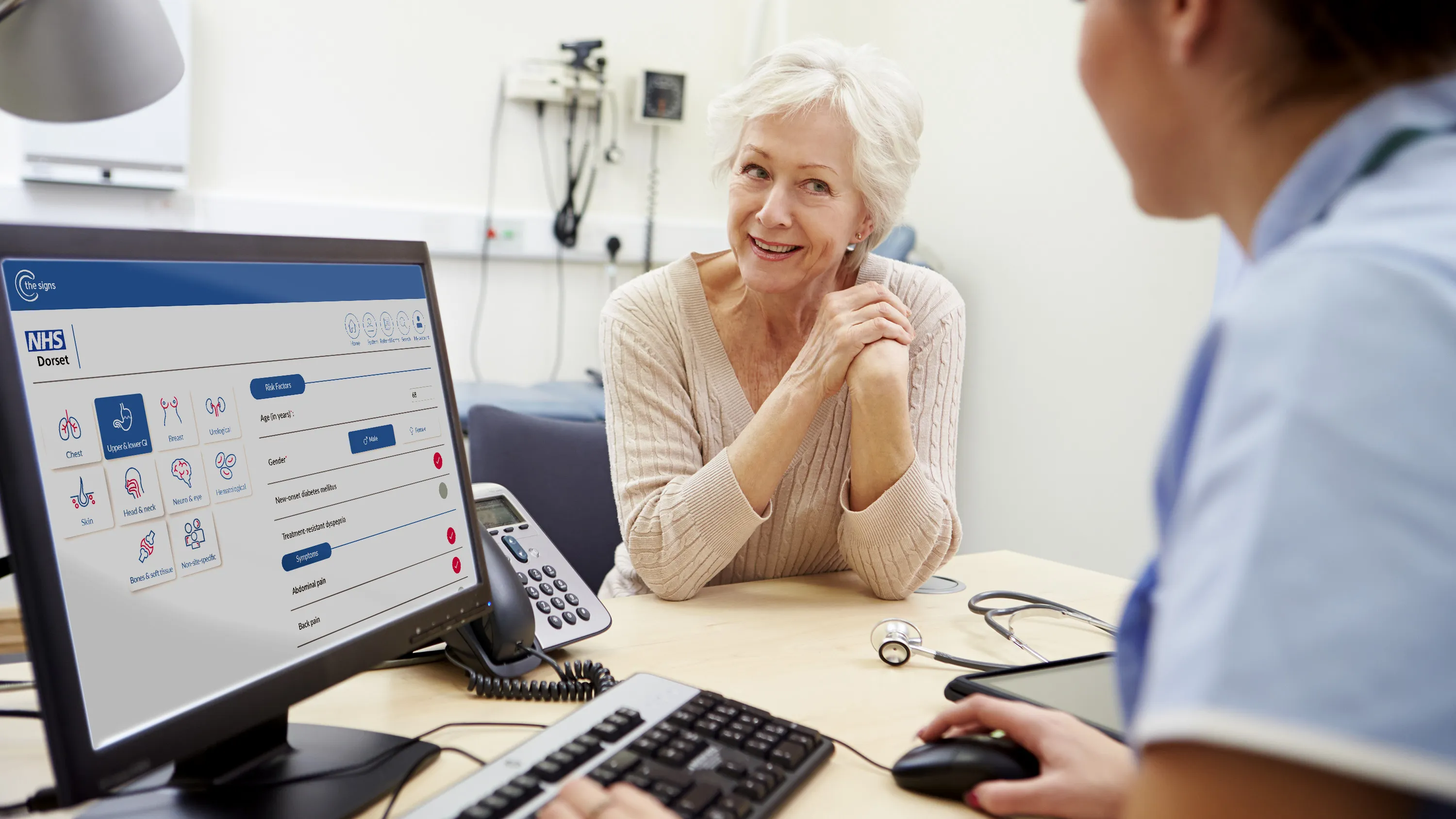
C the Signs Launches Across 70 GP Practices in Dorset ICS
In partnership with NHS England’s InHIP Programme, Dorset Integrated Care System Cancer Programme, NHS Dorset, and Health Innovation Wessex, the C the Signs Cancer Clinical Decision Support System has now been launched across all 70 GP practices in Dorset - marking a major step forward in the region’s efforts to detect cancer earlier and improve survival outcomes.
Transforming Cancer Diagnosis Across Dorset
Dorset’s population has one of the highest rates of cancer in the UK, with its older demographic particularly vulnerable to late diagnosis.
When cancer is found early, lives can be transformed - for example, over 90% of patients survive colorectal cancer for five years or more when diagnosed early, compared to less than 10% when detected late.
By supporting GPs to identify at-risk patients at the earliest possible stage, C the Signs is helping to ensure that every patient in Dorset has an equal chance of earlier detection and better outcomes.
Reducing Inequalities, Increasing Access
Working in alignment with NHS England’s Core20PLUS5 approach to tackling healthcare inequalities, this partnership focuses on raising awareness, increasing community engagement, and ensuring equitable access to cancer diagnostics - particularly in areas of high deprivation.
The rollout is part of the InHIP (Innovation for Healthcare Inequalities Programme), designed to reduce variation in access to care and improve outcomes across the country.
“One of our key priorities is to add healthy life years to people living in Dorset, and early detection of cancer symptoms is key to achieving this.
When caught early, survival rates are greatly improved — and we are confident C the Signs will help us realise that ambition.”
— David Freeman, Chief Commissioning Officer and Deputy Chief Executive, NHS Dorset
Empowering Clinicians, Enabling Earlier Diagnosis
The C the Signs platform integrates directly with GP systems, including EMIS and SystmOne, analysing patient symptoms, risk factors, and medical history to help GPs identify potential cancer risk in under 30 seconds.
By supporting decision-making at the point of care, the platform is helping to reduce missed diagnoses, speed up referrals, and ensure patients access the right tests and pathways sooner.
This initiative is another step towards making early diagnosis the standard - not the exception - across the NHS.
A Shared Mission
“We’re proud to partner with NHS Dorset, Health Innovation Wessex, and NHS England’s InHIP programme to bring our platform to every GP practice in the region.
Together, we’re working to ensure every patient - regardless of where they live - has the best possible chance of surviving cancer.”
— Dr Bea Bakshi, Co-Founder and CEO, C the Signs
Driving Impact Across the NHS
C the Signs is now used by over 10,000 healthcare professionals across 1,500 GP practices, helping detect a patient with cancer every 22 minutes and supporting early detection across more than 100 cancer types.
By combining AI, clinical evidence, and national cancer pathways, C the Signs continues to redefine what’s possible in cancer detection - giving patients back time, choice, and hope.
📖 Read the full article on HSJ: www.hsj.co.uk
📩 Contact us at hello@cthesigns.com to learn how C the Signs can accelerate early cancer diagnosis in your region.
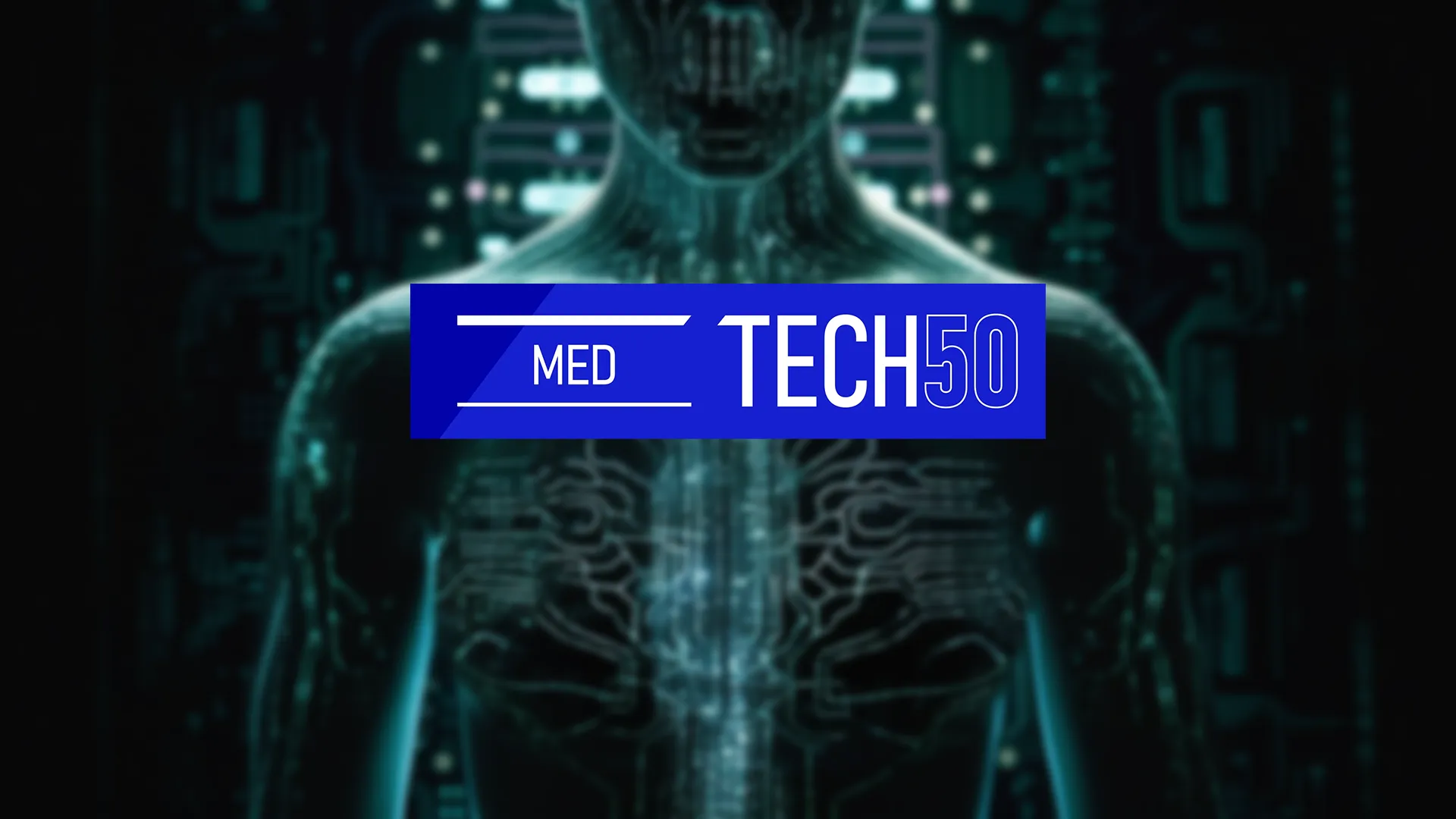
C the Signs Ranked 3rd In BusinessCloud’s MedTech 50
Recognised as One of the UK’s Leading HealthTech Innovators
We’re honoured to announce that C the Signs has been ranked 3rd in BusinessCloud’s MedTech 50, the annual ranking that celebrates the most innovative medical technology creators, developers, and adopters in the UK.
This recognition highlights the impact of our mission - using AI to detect cancer earlier and save lives - and reflects the growing importance of technology in transforming how healthcare is delivered.
Celebrating Innovation in MedTech
The MedTech 50 list, supported by digital transformation experts Sputnik Digital, recognises UK companies that are revolutionising medicine, patient care, and clinical outcomes through technology.
This year’s finalists were chosen through a combination of public votes and independent judging, drawing almost 800 votes from across the sector.
The judging panel included:
- Avi Mehra, Co-founder and Managing Director, Doctorpreneurs
- Leontina Postelnicu, Head of Health and Social Care, techUK
- Abeyna Bubbers-Jones, CEO, Medic Footprints
- Jonathan Symcox, Editor, BusinessCloud
We’re incredibly proud to have been recognised alongside so many inspiring organisations driving innovation in healthcare.
Recognition That Fuels Our Mission
Awards like this represent more than recognition — they’re a reminder of why we do what we do.
Every vote and every mention helps raise awareness for our mission to create a world where everyone survives cancer.
“We’re truly grateful to everyone who voted for us and to BusinessCloud for this honour. Recognition like this pushes our mission forward - using technology to give people back time, choice, and life.”
- Dr Bea Bakshi, CEO and Co-Founder of C the Signs.
About BusinessCloud’s MedTech 50
BusinessCloud’s Tech 50 series showcases the most promising companies transforming key sectors through digital innovation.
The MedTech 50 specifically spotlights those reshaping healthcare — from AI-driven diagnostics to digital health records and next-generation patient tools.
You can view the full 2022 MedTech 50 ranking on BusinessCloud’s website:
👉 Read the full list on BusinessCloud →
About C the Signs
C the Signs is an AI-powered clinical platform that helps healthcare professionals identify patients at risk of cancer earlier, faster, and more accurately.
Founded by NHS doctors Dr Bea Bakshi and Dr Miles Payling, the platform supports clinicians across the UK and internationally — detecting a patient with cancer every 22 minutes.
.webp)
Supporting GPs To Recognise Cancer Symptoms Sooner
For most patients, their GP is the starting point on the path to early diagnosis.
Every year, GPs across the UK see millions of people with symptoms that could - but rarely do - indicate cancer. Recognising which of those subtle signs matter most is critical. At C the Signs, we’re helping GPs identify cancer symptoms sooner, combining AI-driven clinical insight with trusted medical evidence to turn uncertainty into action.
The Challenge of Early Cancer Diagnosis in Primary Care
Cancer doesn’t always present clearly.
A persistent cough. Fatigue. Unexplained weight loss.
These are symptoms GPs encounter daily - most often caused by benign conditions, but sometimes the earliest indicators of cancer.
With over 200 cancer types and thousands of possible symptom combinations, even the most experienced clinicians face a challenge: balancing vigilance with efficiency in a 10-minute consultation.
That’s where C the Signs comes in - using data, evidence, and artificial intelligence to ensure no symptom is overlooked.
Turning Complexity Into Clarity
The C the Signs platform analyses symptoms, risk factors, demographics, and clinical data in seconds — highlighting when a patient may be at risk and guiding the clinician to the right next step.
By integrating directly with EMIS and SystmOne, the platform works seamlessly within NHS systems, enabling GPs to:
- Quickly cross-check symptoms against validated cancer pathways
- Identify rare or non-specific presentations earlier
- Refer patients confidently to the most appropriate service
This means patients at risk of cancer receive investigations and treatment sooner — when outcomes are most favourable.
Building Confidence Through Clinical Support
C the Signs isn’t just a platform - it’s built to work with clinicians, not instead of them. It brings together the best available evidence, national guidelines, and AI-powered insight into one clear, easy-to-use interface.
That means:
- Less diagnostic uncertainty
- More consistent, evidence-based referrals
- Improved patient safety and continuity of care
“C the Signs helps me confirm when my instincts are right — and sometimes, when they’re not.
It ensures that no patient slips through the net.”
— GP, North West England
Driving Early Diagnosis Across the NHS
By supporting GPs to recognise cancer symptoms earlier, C the Signs contributes directly to the NHS Long Term Plan ambition:
Diagnose 75% of cancers at stage 1 or 2 by 2028.
Across Primary Care Networks, Cancer Alliances, and Integrated Care Systems, GPs using C the Signs are already seeing measurable impact - with:
- More early referrals
- Faster diagnostic timelines
- Improved accuracy in identifying patients with cancer
Each earlier diagnosis means more patients receiving treatment when it can make the greatest difference - saving time, cost, and lives.
Beyond Technology - A Partnership for Change
Technology alone doesn’t transform healthcare - people do.
That’s why we work closely with GPs, practice nurses, and PCN teams to design and continually refine the platform based on real-world feedback.
Together, we’re transforming early cancer diagnosis from a reactive process into a proactive standard of care - one where every symptom is seen, every risk assessed, and every patient given the best possible chance.
.webp)
Defying Time: How C the Signs Is Transforming Early Cancer Detection Across the NHS
At C the Signs, we believe no one should face a late cancer diagnosis.Our mission is clear and urgent - to empower every GP to detect cancer earlier and give every patient the best chance of survival.
Why We Started
Every two minutes, someone in the UK is diagnosed with cancer. For too many, it’s discovered too late - when options are fewer, outcomes are poorer, and lives are changed forever.
The challenge isn’t a lack of care or compassion - it’s the complexity of cancer itself. With over 100 cancer types and countless symptom combinations, even the most experienced GP can face uncertainty during those vital early consultations.
C the Signs was born from a single question:
“What if technology could help doctors spot the earliest signs of cancer - before it’s too late?”
That question became our why - and our purpose.
What We Do
C the Signs is an AI-powered clinical platform that helps healthcare professionals identify patients at risk of cancer - earlier, faster, and more accurately.
Our technology integrates directly with NHS electronic medical record systems like EMIS, SystmOne, and Vision, analysing combinations of:
- Signs and symptoms
- Risk factors and clinical markers
- Demographic and lifestyle data
Using validated algorithms and national evidence-based pathways, C the Signs supports GPs to assess cancer risk and identify the most appropriate referral or diagnostic route - in under 30 seconds.
The result: fewer missed cases, faster investigations, and more lives given back time.
How It Works
C the Signs combines artificial intelligence, clinical research, and national guidelines to transform medical decision-making.
- Analyse – The platform reviews real-time patient data and symptom inputs.
- Assess – AI cross-checks patterns against validated cancer pathways and the latest clinical evidence.
- Act – GPs receive instant, tailored guidance on next steps - from urgent referrals to diagnostic tests.
By translating complex data into clear, actionable insights, C the Signs enables clinicians to make faster, more confident decisions - while maintaining full clinical autonomy.
Our Impact So Far
C the Signs is now used across the UK by over 10,000 healthcare professionals in 1,500 GP practices, helping identify patients with cancer every 22 minutes.
Validated through independent evaluations and peer-reviewed studies, the platform has shown:
- 99% sensitivity for identifying patients with cancer
- 99% negative predictive value, safely ruling out risk
- 94% accuracy in predicting tumour origin
- Stage shift in harder-to-detect cancers such as pancreatic and ovarian
- Faster time to diagnosis, reducing delays by over 20%
- More equitable detection, with fewer emergency presentations and earlier referrals across diverse populations
Every earlier diagnosis represents more time - and more life - for patients and their families.
The Team Behind the Mission
C the Signs was founded by Dr Bea Bakshi and Dr Miles Payling, two NHS doctors who saw firsthand how late diagnosis can cost lives.
Their experience on the frontline of care inspired a bold vision: a future where technology and medicine work together to make early cancer detection the norm — not the exception.
Today, our multidisciplinary team of clinicians, data scientists, and innovators share one purpose:
to end late cancer diagnosis, for good.
A Future Without Late Diagnosis
Our journey is just beginning.
We’re continuing to advance our AI, expanding across care settings - from primary to secondary care and beyond - to make early cancer detection universal and equitable.
Through partnerships with Cancer Alliances, Health Innovation Networks, and NHS England, we’re shaping a future where no symptom is overlooked and no patient waits too long to be seen.
Our vision is bold, but achievable:
A world where no patient is diagnosed too late.
Join Us
Whether you’re a GP, policymaker, or innovation partner - together, we can rewrite the story of cancer care.
👉 Learn more about our research and impact.
👉 Request a demo to see how C the Signs integrates with your NHS system.
👉 Join our mission to make early detection a standard for all.

Does Masturbation Increase My Risk Of Prostate Cancer?
Prostate cancer remains one of the most common cancers in men, and one of the most survivable when it’s found early. Over the years, there’s been widespread interest in whether sexual activity, including masturbation or ejaculation frequency, might influence prostate cancer risk.
The short answer: research suggests there may be a link, but it’s more complex than it seems.
What the research shows
The idea that ejaculation could affect prostate cancer risk comes from long-term population studies, rather than direct clinical trials. These studies don’t prove cause and effect, but they do reveal patterns worth exploring.
Early studies
In 2009, a UK study (Dimitropoulou et al.) suggested that frequent masturbation in younger men (in their 20s) might be linked to a slightly higher risk of prostate cancer later in life, while frequent masturbation in older men (in their 50s) appeared to be protective.
Researchers proposed that younger men with high testosterone, and therefore higher libido, might already have a greater biological risk due to hormone sensitivity, rather than the act of masturbation itself.
More recent evidence
A larger US study published in European Urology (Rider et al., 2016) followed more than 30,000 men over 18 years. It found that men who ejaculated at least 21 times per month had a 20% lower risk of being diagnosed with prostate cancer than those who ejaculated 4-7 times per month.
The association was strongest for low to moderate grade prostate cancers, suggesting that more frequent ejaculation could play a role in keeping the prostate healthy - potentially by clearing out harmful substances or reducing inflammation.
Another analysis published in 2017 in The Journal of Sexual Medicine (Papa et al.) found that men who had higher ejaculation frequency in their 30s were less likely to develop advanced prostate cancer later in life, although the effect was modest and not seen in all age groups.
More recent meta-analyses (through 2022–2024) have continued to support the idea that ejaculation frequency may offer a small protective effect, but they agree that the evidence remains observational, not causal (Kokori, 2024).
Why might ejaculation help?
Researchers have proposed a few possible explanations:
- Reducing inflammation: Regular ejaculation may help flush out potentially harmful substances or reduce inflammation in the prostate.
- Regulating cell turnover: Ejaculation could help keep cell metabolism stable, reducing opportunities for abnormal cell growth.
- Hormonal balance: Regular sexual activity may help maintain a steady balance of androgens (male sex hormones), which are known to influence prostate cancer risk.
But there’s still no definitive proof. These findings show correlation, not cause - meaning that men who ejaculate more frequently might also lead generally healthier lifestyles.
What does this mean for patients and clinicians?
There’s no medical recommendation for ejaculation frequency as a form of prostate cancer prevention.
However, the evidence is reassuring:
- Masturbation and sexual activity are safe and normal parts of life.
- There’s no evidence that they increase risk at any age.
- Prostate cancer risk is more strongly linked to age, family history, ethnicity, and genetics than to sexual habits.
Encouraging men to understand their risk, attend screening when eligible, and act on new or unusual urinary symptoms remains the best way to protect health.
The takeaway
Ejaculation may have a small protective role in prostate health, but it’s not a proven way to prevent cancer. What we do know is that:
- Early detection saves lives.
- Regular health checks and awareness of changes matter more than any single lifestyle factor.
- Masturbation and sexual activity are healthy and safe.
Prostate cancer caught early is highly treatable. Empowering people with knowledge, not fear, is how we give them back time, choice and life.
References
Dimitropoulou, P., Lophatananon, A., Easton, D., et al. (2009). Sexual activity and prostate cancer risk in men diagnosed at a younger age. BJU International, 103(2), 178–185.
Rider, J. R., et al. (2016). Ejaculation frequency and risk of prostate cancer: updated results with an additional decade of follow-up. European Urology, 70(6), 974–982.
Papa, N. P., MacInnis, R. J., English, D. R., Bolton, D., Davis, I. D., Lawrentschuk, N., Millar, J. L., Pedersen, J., Severi, G., Southey, M. C., Hopper, J. L., & Giles, G. G. (2017). Ejaculatory frequency and the risk of aggressive prostate cancer: Findings from a case-control study. Urologic oncology, 35(8), 530.e7–530.e13. https://doi.org/10.1016/j.urolonc.2017.03.007
Kokori, Emmanuel & Olatunji, Gbolahan & Isarinade, David & Aboje, John Ehi & Ogieuhi, Ikponmwosa & Zainab, Doyinsola & Lawal, Abera & Woldehana, Muhammad & Nazar, & Godfred, Yawson & Scott, Nicholas & Aderinto, & Lawal, Zainab & Woldehana, Nathnael & Nazar, Muhammad Wajeeh & Scott, Godfred & Aderinto, Nicholas. (2024). Ejaculation Frequency and Prostate Cancer Risk: A Narrative Review of Current Evidence. Clinical Genitourinary Cancer. 10.1016/j.clgc.2024.01.015.
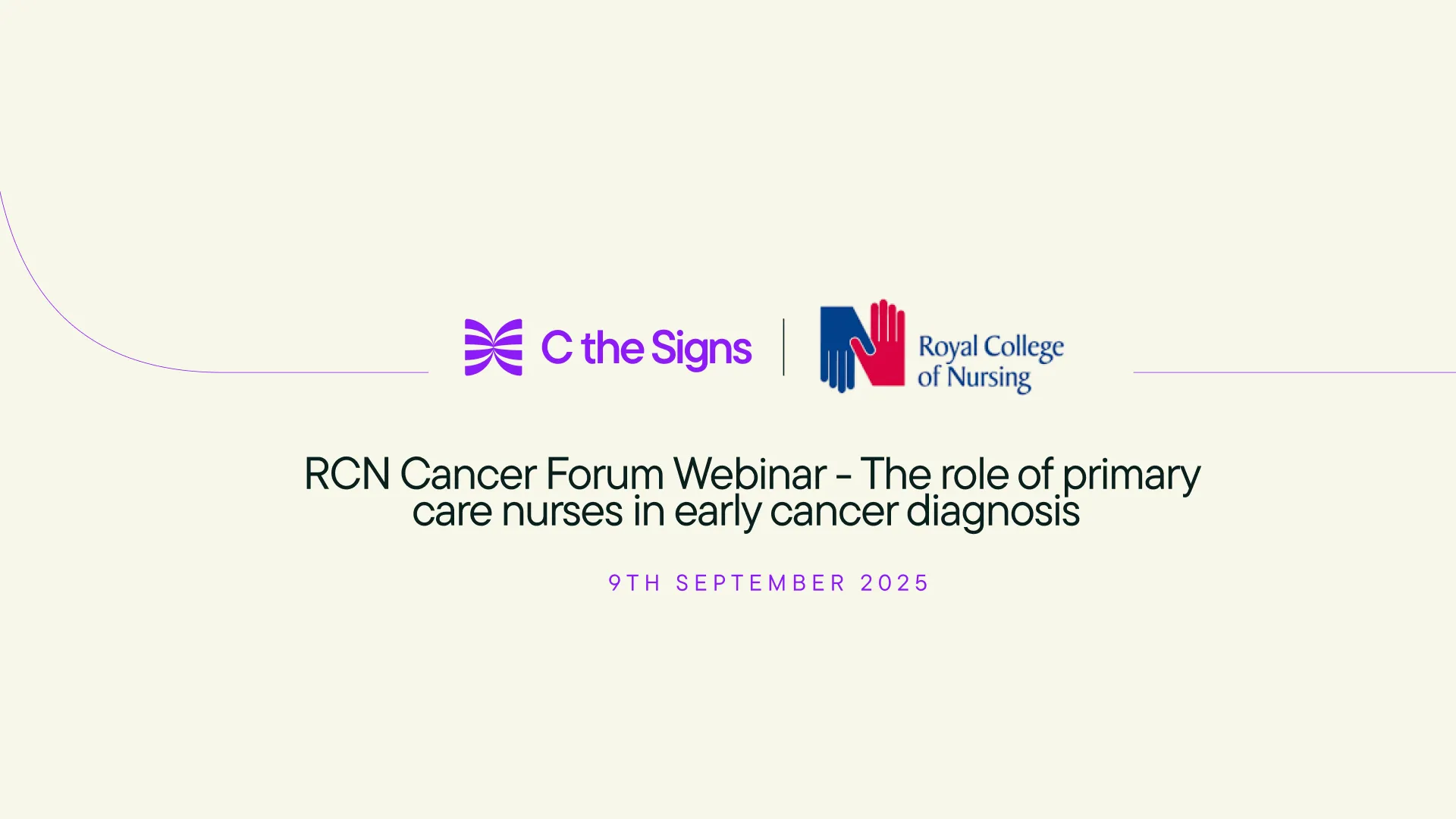
Elevating the Role of Nurses in Early Cancer Detection - RCN x C the Signs Webinar
On 9 September 2025, C the Signs and the Royal College of Nursing (RCN) co-hosted a pivotal webinar titled “The role of primary care nurses in early cancer diagnosis.” The Royal College of Nursing in bringing together nursing professionals, primary care leaders, and clinical innovators, the event made clear that earlier detection of cancer is not just about tools - it’s about people, processes, and partnership.
Why this webinar mattered
- A vital gap to fill. Almost half of cancers in the UK are still diagnosed at a late stage, when treatment is less effective. The Royal College of Nursing In primary care, symptoms are frequently vague or non-specific - meaning the margin for error is narrow, and the cost of delay is high.
- Nurses are central. Whether as practice nurses, advanced nurse practitioners, healthcare assistants, or part of the wider team, nursing staff are often the first to see patients, triage symptoms, and coordinate care escalation. This webinar affirmed their critical role in recognising risk, escalating appropriately, and helping patients navigate diagnostics.
- Digital support can change outcomes. The session introduced how clinical decision support systems - like C the Signs - can augment clinical vigilance, helping teams to assess cancer risk faster, more consistently, and more equitably.
What the webinar covered
The agenda was structured to bridge theory and practice. Key themes included:
- Challenges of early diagnosis in primary care - recognising “red flags” and patterns when symptoms are ambiguous.
- NICE cancer guidelines in real life - translating guidance into day-to-day decisions.
- Case studies - including FIT (faecal immunochemical test), PSA, cervical screening, post-menopausal bleeding, and more.
- Team roles & escalation - how every member of the practice team contributes to spotting and acting on cancer risk.
- Clinical decision support in action - how platforms like C the Signs streamline assessment, flag risk, and suggest appropriate referral pathways.
- Interactive Q&A - giving attendees a chance to probe, challenge, and learn.
What this means in practice
The webinar reaffirmed a powerful shift: early cancer detection will increasingly be achieved not by siloed brilliance, but by connected teams working with intelligent augmentation.
- Nurses become more empowered to act on subtle cues, supported by systems that help flag risk early.
- Diagnostic pathways get activated sooner, shortening the time between suspicion and investigation.
- Inequalities may shrink: consistent decision support helps reduce variation in care across regions and teams.
This aligns with the real-world impact C the Signs is already showing. In GP practices using the platform, cancer detection rates have improved (for example, a jump from 58.7 % to 66.0 % in a study of 35 practices) - doing so without burden to the clinicians.
Voices from the session
One comment from the live discussion echoed what many already believe:
“Even when symptoms don’t look classic, having a prompt or nudge helps us check further rather than wait.”
That underscores exactly why combining human expertise with AI is transformative - we don’t replace intuition or experience, we sharpen and scale them.
Looking ahead: how to make this real
To turn the insights from the webinar into frontline change, we need action:
- Embed tools in everyday workflows. Decision support systems must feel seamless - integrated into existing electronic record systems, not a bolt-on.
- Invest in training & trust. Clinicians need confidence in AI, through education, demonstration, and peer support.
- Track outcomes & learning. Monitor how decision tools affect referral patterns, stage at diagnosis, and equity across populations.
- Champion policy & resource alignment. Systemic support - from commissioners, health systems, and regulators - is essential to scale early detection equitably.
Rewriting what’s possible
The RCN – C the Signs Webinar wasn’t just another educational event - it was a statement of purpose. It reaffirmed that nurses are pivotal to rewriting cancer’s timeline. It showed us that technology, when built with care and aligned to workflow, can restore precious time to patients. And it made clear that early detection is not a dream - it’s an imperative we can deliver together.
At C the Signs, our mission is to give people back time, choice, and life through earlier, safer, more equitable diagnosis. That mission comes alive when we partner with frontline clinicians - and this webinar is just one step in the journey. The transformation is underway, and we’re leading it together.

Winter Fatigue Or Something More?
Feeling more tired than usual as winter sets in is common. Shorter days, colder weather, and the rush of everyday life can leave anyone feeling run down. But sometimes, what feels like normal winter fatigue can be something more, and knowing when to check in with your GP can make all the difference.
Why fatigue is common in winter
As daylight hours shorten, many of us feel our energy dip. Lower vitamin D, changes in sleep patterns, and spending more time indoors can all affect how we feel. For most people, this tiredness passes with rest, daylight, and better routines.
But ongoing fatigue, especially when it’s new, persistent, or hard to explain, deserves attention.
When tiredness might signal something else
Tiredness is one of the most common symptoms GPs see, and it can have many causes: stress, anaemia, thyroid issues, infections, or low mood. Occasionally, it can also be an early sign of something more serious, including some cancers.
That doesn’t mean it usually is, but listening to your body and noticing changes early matters.
It’s a good idea to speak to your GP if:
- You feel unusually tired for more than a few weeks.
- You’ve noticed other changes - like weight loss, persistent pain, bloating, or changes in your appetite.
- Your tiredness is getting worse, or affecting your ability to do daily activities.
- Something just doesn’t feel right.
Trust your instinct.
What your GP can do
Your GP is there to help you figure out what’s behind your symptoms. They may:
- Ask questions about your lifestyle, sleep, or stress levels.
- Arrange simple blood tests to check for common causes like anaemia or thyroid issues.
- Discuss whether further investigations or referrals are needed.
Early conversations mean early answers. And if something more serious is found, early detection gives people more time, more choice, and more life.
Taking care of yourself this winter
There are small things you can do that help boost your energy and protect your health:
- Try to get outside for natural light every day, even briefly.
- Keep hydrated and eat regularly - skipping meals can make tiredness worse.
- Move your body in ways that feel good.
- Prioritise rest - recovery is part of productivity.
- Notice changes and speak up early.
The takeaway
Feeling tired in winter is normal. But if the tiredness lingers, feels different, or comes with other changes, don’t ignore it. Checking in early can make a real difference, and sometimes, it can even save a life.
Because when it comes to health, time matters.
Early conversations lead to earlier answers, and earlier answers give people back control, confidence, and choice.

Do Sunbeds Give A False Sense Of Safety?
Sunbeds are often promoted as a “controlled” way to tan, a chance to build colour gradually and avoid burning on holiday. On the surface, it sounds like a sensible option.
But science tells a different story.
There’s no such thing as a safe tan from a sunbed. The idea that tanning under UV light can protect your skin later on is a comforting myth, one that’s left many people unknowingly at risk.
The myth of protection
A tan isn’t protection, it’s proof that your skin has been working hard to defend itself. That change in colour is your body’s signal that it’s already had too much UV exposure.
Research shows that using a sunbed before 35 increases the risk of melanoma by up to 59%.
Melanoma is one of the most serious forms of skin cancer, but when detected early, around 90% of people survive (Cancer Research UK). That’s why awareness and timely detection are so important.
Sunbeds don’t build protection, they build exposure.
Why this belief persists
For years, sunbeds have been described as “controlled UV.” The message has been that a few short sessions are safer than natural sunlight. In reality, the UV rays from a tanning bed can be up to six times stronger than the midday Mediterranean sun. Even one session can damage the DNA inside skin cells - the code that controls how they grow and repair. When that damage builds up, it can cause cells to grow abnormally and form cancer.
Why it matters now
In October 2025, leading dermatologists and cancer experts urged the UK Government to follow Australia’s example and ban commercial sunbeds altogether. Their call was supported by research published in the BMJ, which concluded that an immediate, outright ban on commercial sunbeds, combined with public education, is the most cost-effective way to reduce skin cancer, save lives and ease pressure on the NHS (Kreft et al., 2025).
Countries such as Australia, Brazil and Iran have already implemented bans after clear evidence linked tanning beds to melanoma. Experts argue that with melanoma rates still rising in the UK, similar action here could prevent thousands of avoidable cancers each year (Kreft et al., 2025).
This isn’t a debate about personal choice; it’s about ensuring everyone has the same opportunity to make informed decisions, free from misinformation or risk. Education and prevention save lives long before treatment is ever needed.
What you can do
You don’t have to give up how tanning makes you feel to stay safe. There are simple, healthy alternatives:
- Choose sun-free glow: Self-tan lotions and sprays give the same colour without UV exposure.
- Protect your skin: Use SPF 30+ daily, even in the UK. Wear a hat and stay in the shade when the sun is strongest.
- Know your skin: Check regularly for new moles or changes. If something looks different, speak to your GP - early detection saves lives.
- Share the message: Talking about tanning myths helps others make informed choices too.
The takeaway
Sunbeds may feel safe because they’re familiar, controlled and easy, but they aren’t harmless. Knowing the truth isn’t about fear, it’s about freedom: the freedom to choose options that protect your skin and your future.
Every moment of awareness, every early detection, every informed choice gives people back time, choice and life.
References
https://www.bmj.com/content/391/bmj-2025-085414
https://www.cancerresearchuk.org/get-involved/campaign-for-us/all-our-campaigns/sunbeds
